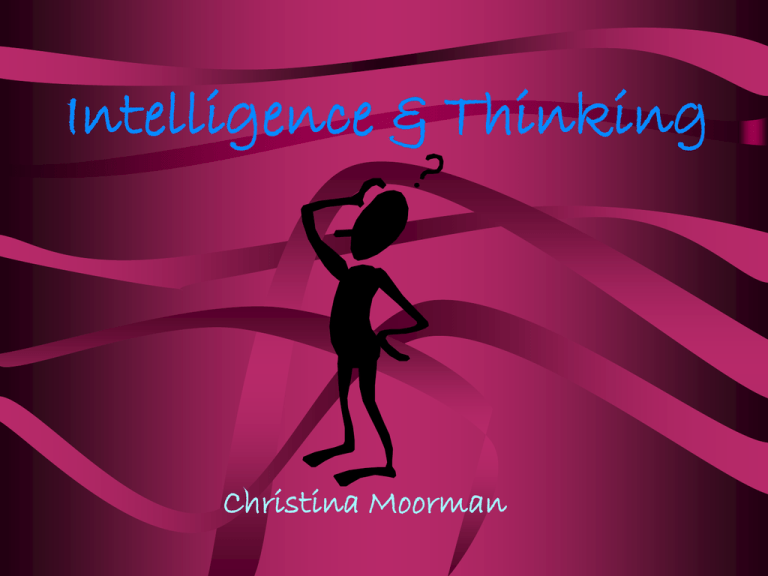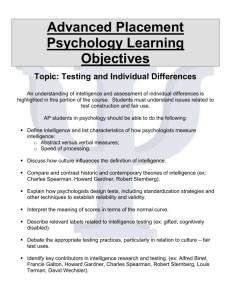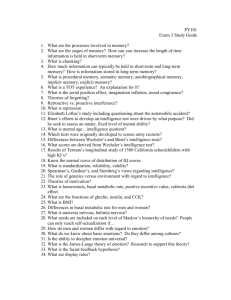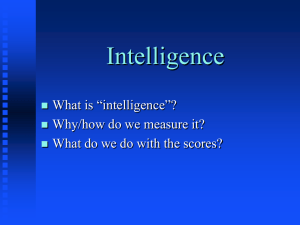right click here
advertisement

Intelligence & Thinking Christina Moorman Intelligence • Intelligence is from the A. Greek word inteleca B. Latin word intellectus C. French word integente D. Pig-Latin word ellencgenceintay Intelligence B. Latin word intellectus Galton • Concluded that intellectual abilities were heritable • Developed models for the statistical tests that we use today • Developed logic of twin/adoptive parent studies Galton • Was the cousin of… A. Piaget B. Socrates C. Darwin D. Binet Galton C. Darwin Intelligence • Modern Definition : A person’s ability to •Learn and Remember information •Recognize concepts and their relations •Apply the information to their own behavior in an adaptive way 3 Major Approaches to Studying Intelligence A. Investigates the types of skills people use to think and solve various types of problems B. Devise tests that identify and measure individual differences in people’s abilities to solve problems 1. Differential approach 2. Developmental approach 3. Information-processing approach C. Studies the ways in which infants learn to perceive, manipulate & think about the world Intelligence 1. Differential approach B. Devise tests that identify and measure individual differences in people’s abilities to solve problems • Especially used in the classroom Intelligence 2. Developmental approach C. Studies the ways in which infants learn to perceive, manipulate & think about the world • Piaget Intelligence 3. Informationprocessing approach A. Investigates the types of skills people use to think and solve various types of problems • Cognitive psychology Intelligence Is Intelligence a global trait, or is it a composite of separate, independent abilities?? •Like “athletic ability” Intelligence 3 Theories of Intelligence 1. Spearman’s Two-Factor Theory 2. Information-Processing Theory 3. Neuropsychological Theory Spearman’s Two-Factor Theory • Intellectual ability is determined by 2 factors : g factor & s factor B. t factor & f factor A. s factor & t factor D. f factor & g factor C. Spearman’s Two-Factor Theory A. g factor & s factor g factor • general factor • common to all intellectual tasks • analogies: LAWYER:CLIENT::DOCTOR: g factor Made up of : · apprehension of experience – perceiving & understanding what just happened · eduction (figuring out) of relations – perceiving the relationship between things · eduction of correlates – apply a rule learned from one case to another LAWYER:CLIENT::DOCTOR: s factor • factor specific to a particular test Information-Processing Theory • Sternberg •Triarchic theory Triarchic theory 1. Componential intelligence – – – Metacomponent Performance components Knowledge acquisition components 2. Experiential intelligence 3. Contextual intelligence Triarchic theory 2. Experiential A. Ability to deal effectively with new situations and automatically solve old problems 3. Contextual B. Mental mechanisms people use to plan and execute tasks 1. Componential C. Intelligence reflecting learned behaviors Triarchic theory B. 1. Componential A. 2. Experiential C. 3. Contextual Factor Analysis • Spearman & Pearson • identify common factors that are being examined among groups of tests • Factors: abilities that affect performance on more than 1 test Factor Analysis • Thurstone • found 7 factors •contradicted Spearman? Factor Analysis • Eysenck •Second-order factor could be g Factor Analysis • Cattell • Found 2 second-order factors 1. Fluid intelligence 2. Crystal intelligence Neuropsychological Theory • Gardner • based on a neurological analysis of human abilities Neuropsychological Theory • Falls into 7 categories : – linguistic, musical, logical-mathematical, spatial, bodily-kinesthetic, interpersonal and intrapersonal – All are well represented in the brain • Advantages Intelligence We clearly cannot measure the intellectual ability of people in other cultures against our own standards! Intelligence Testing • Controversial topic • It an accepted means of evaluation degree of mental retardation Intelligence Testing • Binet • sensory tests alone cannot determine intelligence • Mental Age (MA) • Intelligence Quotient (IQ) MA/CA * 100 Intelligence Testing • Binet’s test is now called : A. Binet-Simon Scale B. Binet Intelligence Questionaire C. Binet Scale of Intelligence D. Stanford-Binet Scale Intelligence Testing D. Stanford-Binet Scale • Tasks grouped according to MA Intelligence Testing • Wechsler •WAIS stands for : A. Wechsler Animal Intelligence Scale B. Wechsler Animated Interest Survey C. Wechsler Adult Intelligence Scale D. We’re All Insane Sometimes Intelligence Testing C. Wechsler Adult Intelligence Scale • Armed Forces • Tests verbal & performance abilities separately - Identify brain damage • Wechsler Intelligence Scale for Children (WISC) • Revised versions Intelligence Testing • Possible problems Intelligence: Nature vs. Nurture • Nature – Heritability • Nurture - Newborns do not possess substantial intellectual ability - Drugs - Genetics - Educational influences Intelligence: Nature vs. Nurture • 50/50 of variability • Race Thinking • Categorizing, reasoning, solving problems • Hidden • Language , shapes & images • Unconscious Thinking • Three important elements 1. Classifying 2. Logical reasoning 3. Problem solving Classifying • Concepts are : A. Categories of objects, actions or states of being that share some attributes B. Concrete memories formed from ideas C. Thoughts that can be verbalized D. Gathering at which lots of loud music is played Classifying A. Categories of objects, actions or states of being that share some attributes • Generalization! • Natural concepts & Formal concepts Classifying • Natural concepts - Categorization based on our own perceptions & interactions • Exemplars - collections of memories of particular things that share similar characteristics Classifying • 3 Types of Natural Concepts 1. Basic-level concepts • Distinctions between categories Classifying •3 Types of Natural Concepts 2. Superordinate concepts • Collections of basic concepts Classifying • 3 Types of Natural Concepts 3. Subordinate concepts • Specific types of concepts Logical reasoning • Deductive • Inductive A. Inferring general principals or rules from specific facts B. Inferring specific instances from general principals or rules C. To purchase on sale Logical reasoning • Deductive B. inferring specific instances from general principals or rules • Syllogisms • Inductive A. inferring general principals or rules from specific facts • Logical errors Problem solving • Problem solving is : A. Finding a path to the solution B. Ultimate function of thinking C. Algorithms & Heuristics D. All of the above Problem solving D. All of the above • Finding a path to the solution • Ultimate function of thinking • Algorithms • Heuristics Problem solving Intelligent problem solving involves more than trying out various actions to see whether they bring one closer to the solution; it involves PLANNING! Planning = trying it out in our heads. Questions? The End





